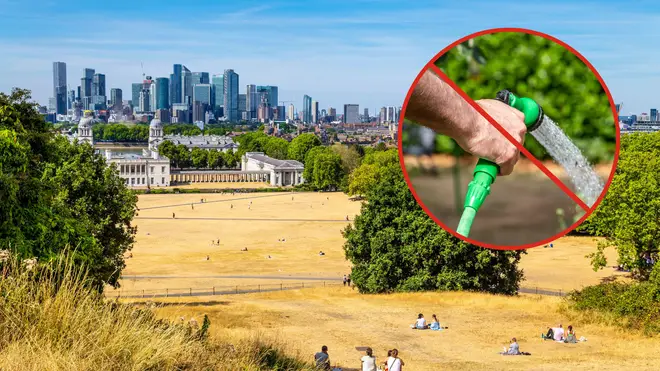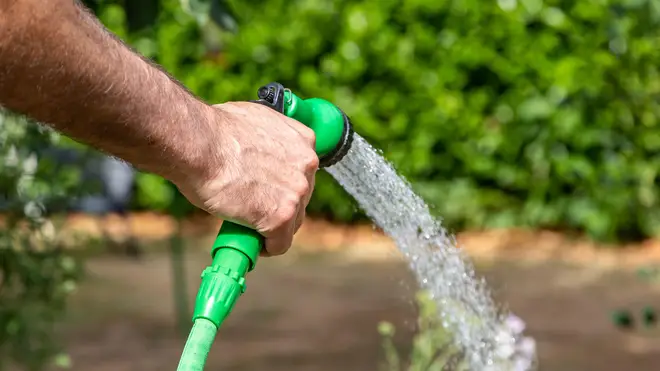
Ben Kentish 10pm - 1am
9 August 2022, 07:18 | Updated: 9 August 2022, 14:48

Thames Water has become the latest water company to announce plans for a hosepipe ban, amid fears that Britain is teetering on the edge of a drought and restrictions will last until October.
In a move that will infuriate millions of people the UK's largest water firm - which supplies more than 15million homes across most of Greater London, the Thames Valley, Surrey, Gloucestershire, north Wiltshire and parts of west Kent, announced it will implement a 'temporary' hosepipe ban in 'the coming weeks'.
And the announcement came just after two gigantic leaks in north London and north Kent, where huge amounts of water flooded streets, houses and businesses.
A spokesperson for the water company said: "Given the long-term forecast of dry weather and another forecast of very hot temperatures coming this week, we are planning to announce a temporary use ban in the coming weeks.
"We have written to the Environment Agency to update them on our approach and informed Ofwat.
"The timing is not confirmed due to a number of operational and legal procedural requirements but we will be updating our customers, partners, regulators and stakeholders at the earliest time to ensure a co-ordinated approach.
"In the meantime, we continue to urge our customers to only use what they need for their essential use."
Summer hosepipe bans and fire warnings could continue until October with no "meaningful rainfall" expected over the next two months according to the latest forecasts.
Water companies across the UK have issued warnings to consumers amid fears the country is heading for a drought.
Two water companies have introduced hosepipe bans including Southern Water which affected 935,000 from last Friday, and others are encouraging consumers to be mindful of their water usage.
The National Drought Group moved England into "Prolonged Dry Weather" status, which is the final stage before an official drought, at an emergency meeting last month.
According to the Met Office, July 2022 was the driest July for England since 1935, with England getting just 35% of its average rainfall for the month, and Wales 53%.
Read more: Impose more hosepipe bans, environment sec urges ahead of mid-30C temperatures
Hot weather and low rainfall mean supplies are low.
— Southern Water (@SouthernWater) August 5, 2022
From today we’re asking customers in #Hampshire and #IsleofWight to only use what's needed to protect supplies and rivers.
To find out more, visit: https://t.co/JluLEN5tiT pic.twitter.com/1ER9UQnN4w
Scientists warn that the likelihood of droughts occurring is becoming higher due to climate change, driven by greenhouse gas emissions from burning fossil fuels and other human activities.
Climate change is also making heatwaves more intense, frequent and likely - with last month's record temperatures made at least 10 times more likely because of global warming, and "virtually impossible" without it, research shows.
It comes as the UK Health Security Agency (UKHSA)'s implement an amber weather alert which covers southern and central England from midday on Tuesday until 6pm on Saturday, with experts advising people to look out for those who are older or with existing health conditions, as well as young children.
With the latest heatwave coming after months of low rain, which have left the countryside and urban parks and gardens tinder-dry, households in some areas are being urged not to light fires or have barbecues.
Read more: Heatwave returns: Health chiefs issue level 3 alert ahead of 30C temperatures

Tory leadership frontrunner Liz Truss, meanwhile, has weighed in after two water companies announced hosepipe bans and others warned they may need to follow suit, following the driest eight months from November to June since 1976 as well as the driest July on record for parts of southern and eastern England.
Ms Truss said: "My view is that we should be tougher on the water companies and that there hasn't been enough action to deal with these leaky pipes which have been there for years.
"I have a lot of issues with my water company in Norfolk, which is a particularly dry area of the country, and those companies need to be held to account."
She told the Daily Express hosepipe bans "should be a last resort".
"What I'm worried about is it seems to be a first resort rather than the water companies dealing with the leaks."
The amber heat alert "requires social and healthcare services to target specific actions at high-risk groups", but is one stage lower than the most serous level four red warning issued in last month's heatwave.
Lib Dem leader Sir Ed Davey said water company bosses have been getting away with "blue murder" while raking in huge profits.
The Met Office said temperatures over coming days will not be as extreme as the record-breaking heat in July when the thermometer climbed above 40C, however it is still likely to rise into the low to mid-30s in central and southern parts of the UK.
☀️ Sunshine from the word go for many on Tuesday morning with temperatures quickly climbing
— Met Office (@metoffice) August 8, 2022
🌧️ Cloudier skies will persist across northwest Scotland as rain pushes across the Northern Isles pic.twitter.com/WsiL5p9v3l
Heatwave thresholds - which are met at different temperatures in different parts of the country - are likely to be hit in much of the UK.
Outside the hottest areas, much of England and Wales and south-east Scotland could see temperatures widely in the high 20s, with a chance of a few spots seeing temperatures into the low 30s, the Met Office said.
Scotland and Northern Ireland will also see temperatures in the high 20s and could reach official heatwave criteria by Friday, the forecasters said.
With the latest heatwave coming after months of low rain, which have left the countryside and urban parks and gardens tinder-dry, households in some areas are being urged not to light fires or have barbecues.
The Met Office's fire severity index (FSI), an assessment of how severe a fire could become if one were to start, is very high for most of England and Wales, and will reach "exceptional" for a swathe of England by the weekend.
Scientists warn that the likelihood of droughts occurring is becoming higher due to climate change, driven by greenhouse gas emissions from burning fossil fuels and other human activities.
Climate change is also making heatwaves more intense, frequent and likely - with last month's record temperatures made at least 10 times more likely because of global warming, and "virtually impossible" without it, research shows.